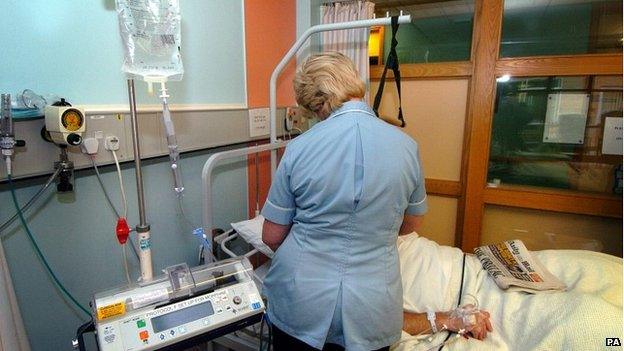Jobs boom but not living standards
- Published
- comments

The proportion of jobs in the public sector has fallen markedly in the past few years
So there are some very striking - and perhaps odd - things going on in the jobs market.
Much of it looks positive - such as the 345,000 increase in people in work during the three months to April.
Which is the biggest quarterly rise in employment since records began in 1971.
The increase in employment over the year was 780,000 - which included a jump of 457,000 in the number of employees and a 337,000 increase in self-employment.
And yes, I know that the combined increase in employees and self-employees is more than the increment in employment. The explanation for this apparent solecism is presumably that some people are both employed and self-employed.
Now if depressions were measured by the employment rate, the UK depression would be officially over - because the employment rate is now 72.9%, which is 0.1 of a percentage point higher than before the start of the slump at the beginning of 2008.
And the employment rate is only a whisker below it's all-time high of 73.1% - attained in early 2005 and in late 1974.
If the most important thing about an economy is the way it provides gainful employment, then the UK is doing pretty well. It is all splendidly wonderfully tickety boo, n'est-ce pas?
Well not everyone loves the way that the recovery in the economy is rewarding non-UK nationals and those not born in the UK.
So in the latest three months compared with the same time last year, there was an increase in employment of non-UK nationals of 178,000, taking the total to 2.77 million, and a rise in the employment of those not born in the UK of 292,000, to 4.55 million.
Now depending on your point of view, the UK's openness to overseas workers is either an explanation for why the economy is recovering faster than others in Europe, or unfair to the British unemployed, or good for the culture and quality of life of UK citizens, or bad for them.
You can wrangle over all that.
Labour market slack
And then there are some other trends material to how we feel about all this jobs growth.
One is that is that self-employment continues to rise strongly - which begs the question whether this is a lifestyle choice or needs-must.
If the rise in self-employment is making the best of a bad lot, then it means there are still hundreds of thousands of people keen to be taken on as employees by a larger business.
That would imply there is still some slack in the labour market.
And this in turn would go some way to explain why wage inflation remains subdued.
Total pay rose just 0.7% in the three months to April, and pay minus bonuses increased just 0.9% - both well below the 1.8% rise in CPI inflation that month.
Or to put it another way, real pay - having increased marginally for a few weeks - is falling again.
'Cynical'
By far the biggest reason why pay has fallen is that a year ago, bonus payments and pay-rises were being shifted from March to April, after the start of the new tax year, to take advantage of the cut in the top rate of tax from 50% to 45%.
So pay was artificially inflated a year ago.
This was particularly conspicuous in the finance sector (hello you lovely bankers) - where total pay rose 5.6% in April 2013 and fell 6.1% in April 2014.
So if you strip out the cynical tax planning, pay is rising faster than the headline figures, but not at any great rate of knots.
There is no sign that what we are paid is rising faster than the cost of living - except in manufacturing, shops, hotels and restaurants.
One other thing, quite a profound shift in the balance between public and private sectors in the British economy since the financial debacle of 2007-8, can be seen in the jobs figures.
For most of 2009, the public sector provided 22% of all employment in the UK. That had fallen to less than 18% by April of this year - and looks to be on a declining trend for some years yet.